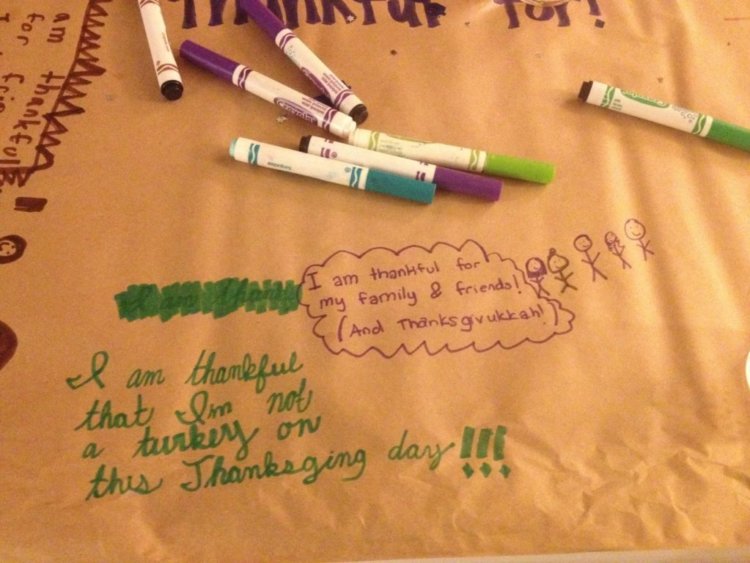
When I moved from New York to Los Angeles, I didn’t fully realize that I was moving away from my entire family. As I fell quickly into Jewish communities here, the Jewish holidays weren’t a problem. But then people started asking: are you going home for Thanksgiving? While Thanksgiving was always something my family did – I mean, any reason to get together and eat really well, especially if there were no religious holiday restrictions involved – to fly home on one of the most expensive and busy travel days of the year, didn’t seem pragmatic. And luckily, I had a friend here who had been to a Kustanowitz Thanksgiving in New Jersey decades ago; now she and her family open their doors for me every year, only demanding one thing in return: the roasted chestnuts that my father always made for our Thanksgiving celebrations. I am happy to oblige. And I am grateful for this, joining a family that is only one step removed from my own, for Thanksgiving.
But many people do an alternate form of Thanksgiving – passing on opportunities to see family and opting instead for gatherings of friends, where – presumably – the atmosphere is more homogeneous, and dinner guests are less likely to trot out racist screeds, political polemics or embarrassing videos or stories over dinner. Still others want to celebrate in multiple spaces, tacking on a “friendsgiving” in addition to any traditional family gatherings they may attend – or boycott.
Due to health reasons, Margie Katz wasn’t able to fly home for Thanksgiving this year. After being invited to two dinners with friends and their in-laws, she realized the idea of being around other families and their kids would only make her feel sadder. Her various dietary restrictions nearly guaranteed that she wouldn’t be able to eat a lot of the food. So she got together with a close friend – “who hates the holidays,” she said – and the two of them are doing their own thing: a dinner with some of the traditional Thanksgiving foods and a movie.
“The minute I made the decision, I felt much better about things and started shopping for a free range bird and all the fixings,” said Katz, who works in tech. “Whatever we have left over will be donated to the local homeless encampment. We’ll probably see either The Florida Project or Three Billboards.”
Hospice Rabbi Len Muroff lives in Los Angeles, but his family is on the east coast and in Canada; his twentysomething daughters are in New York and Spain this year. “I am gathering with other orphans or Lone Celebrants,” he said. “We become family to each other.” He said the essential elements of his Friendsgiving include the Challurkey (a challah bread shaped like a turkey, made by a local bakery specially for Thanksgiving – see our new video here!), and “appreciating my blessings, though they are different ones than I imagined having at this point in my life.”
Jennifer Holder, a nonprofit manager/professional from Chattanooga, Tennessee, holds an annual Friendsgiving “to build community among our friend group and celebrate each other,” she said. “Chattanooga is a small, close knit city, and everyone knows everyone, so Friendsgiving is used to build a deeper connection.” In addition to eating together – guests are invited to bring a dish to share – Holder’s Friendsgiving has a talent show: people perform stand up comedy, improv, songs, poetry readings, and more, and the event ends with with dancing and more dessert. About 65 people came to this Friendsgiving, which was held last weekend.
In Eagle Rock, on the east side of Los Angeles, an organization called Miry’s List has made it their mission to pay gratitude forward, committing to directly help New Arrival families from Syria, Afghanistan, Iran, and Iraq. In 2017, over 50,000 refugees will be resettled in the U.S., the organization’s website notes, adding that most are families with young kids, who leave behind virtually everyone they know and virtually everything they own to find safety and a brighter future.
The site urges users to use the platform to host a Friendsgiving holiday meal, at which guests contribute whatever they can. 100% of Friendsgiving with Miry’s List donations will provide life-changing programming and services to New Arrival families resettling in America. Miry’s List is already serving 250 families who recently resettled in California; their goal is to raise $75,000 in November to serve the next 100 families. Donations can be given here.
For Sheridan Gayer, in NYC, Friendsgiving “isn’t necessarily an alternative to going home, but a way to catch people who come ‘back’ home to NYC and surrounding areas and also an excuse to catch up with friends,” she said. “It also helps us all mentally prepare for whatever going ‘home for the holidays’ may bring.”
Whether you are doing Friendsgiving for the first time or for the 20th, whether you’re using it to replace a family gathering or as a supplementary celebration, we wish you a marvelous Thanksgiving from us here at Grok Nation. We’ll be your virtual Friendsgiving, and may we together have much to be grateful for!


Grok Nation Comment Policy
We welcome thoughtful, grokky comments—keep your negativity and spam to yourself. Please read our Comment Policy before commenting.